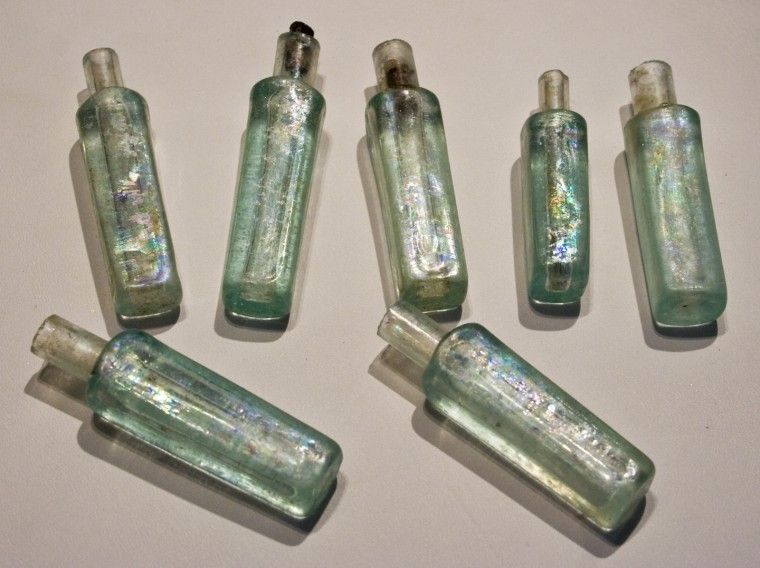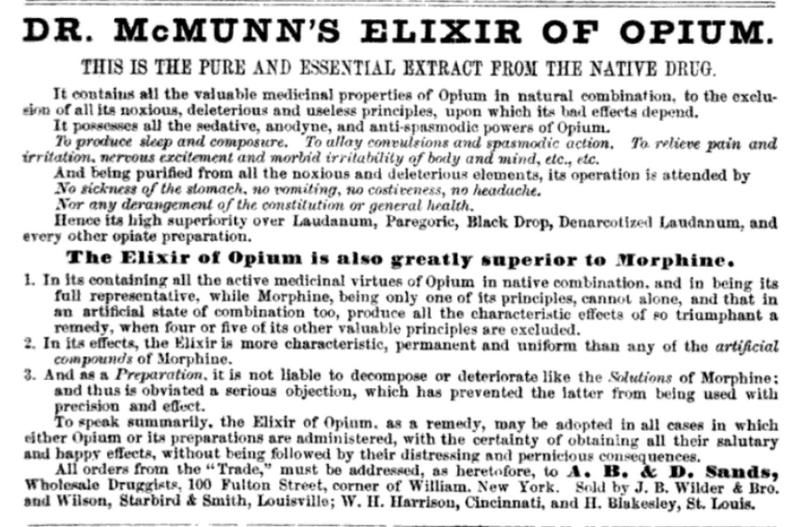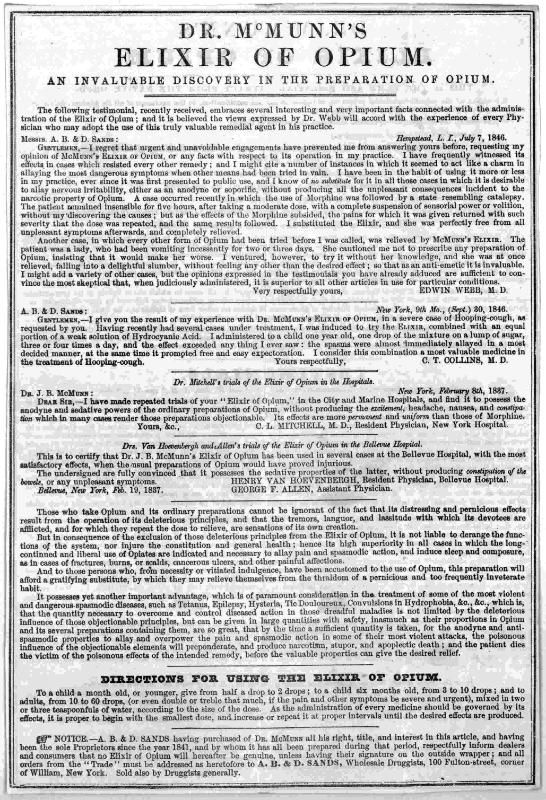Skip to comments.
When opium was cheaper than whiskey – and Great Britain waged a "wicked" drug war
Cannon Beach Gazette ^
| Thursday, February 16, 2012
| Robert Lewis Knecht
Posted on 02/19/2012 12:32:31 PM PST by DogByte6RER
When opium was cheaper than whiskey – and Great Britain waged a "wicked" drug war
When Opium Was Cheaper Than Whiskey - and Great Britain waged a "wicked" drug war
The bottles have a beautiful aqua color to them. If you hold them up to the light, rainbows fire across the delicate patina. But their beauty belies the deadly reality behind the delicate hues.
The bottles once held opium based "elixirs," such as Dr. McMunn's Elixir of Opium, most claiming to be a cure for a host of ailments, including the relief of "convulsions and spasmodic action," as well as "pain and irritation, nervous excitement and morbid irritability of body and mind." Some brands were even marketed to mothers to "quiet" their babies by putting them to sleep - sometimes permanently, through overdosing. Ironically, some brands claimed not to be habit forming! This is obviously why the FDA was invented.
The bottles were recovered by a dedicated "digger" friend of ours scouring the remains of a Chinese hotel which was in operation in the later 1800s in a mining town north of Vancouver, B.C.
So how did opium bottles make their way to a tiny mining town in British Columbia? Indeed, Chinese opium dens of the period have been immortalized in such movies as Tombstone and Deadwood, but this story takes us back hundreds of years to what might be considered the beginning of the "problem," when Europe first started trading with China during the Age of Discovery in the mid-16th Century.
Historians and archaeologists believe the cultivation of opium poppies for food, anesthesia, and ritual purposes dates back to at least the Neolithic Age (circa 10,000 B.C.). Important medical texts of the ancient world tell us that the Sumerian, Assyrian, Egyptian, Indian, Minoan, Greek, Roman, Persian and Arab Empires all made use of opium, which was the most potent form of pain relief then available, allowing ancient surgeons to perform prolonged procedures. Widespread medical use of unprocessed opium continued through the American Civil War before giving way to morphine and its successors, which could be injected at a precisely controlled dosage.
The recreational use of opium in China is believed to have taken hold in the 15th Century, but its use was limited by its rarity and expense. However, that began to change in the 17th Century when it was mixed with tobacco for smoking, and some speculate that its addictive nature was first recognized. In 1729, China outlawed opium... but it was too late.
While Europe's trade imbalance with China began in the early 1500s, by the 18th Century it was out of control. From the inception of the Canton System by the Qing Dynasty (1644 to 1912) in 1756, trade with China was extremely lucrative for European and Chinese merchants alike. The system granted a monopoly to the British East India Company, on one side, and the Thirteen Hongs on the other. But maritime trade was only allowed to take place in Canton.
There is a phrase that goes something like this, "absolute power corrupts absolutely," and is perfect to describe what happened next: In 1793, Emperor Qianlong (1735 - 1796) decreed that, "China is the center of the world and has everything we could ever need," and that all Chinese products could only be bought with silver. Being students of world history, April and I know when we see a quote like this that things are about head south. And that's exactly what happened for his Worshipfulness, Qianlong, the man with all the answers.
With the Emperor's decree, it became impossible for the British to import the same low-value manufactured consumer products to China as that they traded in India, and which the average Chinese person could afford to buy.
Britain had been on the gold standard (based on the Spanish gold doubloon) since the 18th century, so it had to purchase silver from continental Europe and New Spain (present day Mexico), to supply the Chinese appetite for silver. Attempts by the British, Dutch, and Russians to gain trade access to the Chinese market failed. And by the early 1800s, Britain was getting very concerned about its ever shrinking silver stocks. They had to come up with a commodity that Chinese merchants wanted so badly they would risk imperial wrath to purchase it with silver. That "commodity" was opium, cultivated at British East India Company plantations in India. This turned out to be very good for the British, the Chinese merchants who smuggled it into the country, and the government officials who were "paid to be blind." But the same couldn't be said for the poor addicts!
The smoking of opium quickly spread from the rich to about 90 percent of all Chinese males under 40 years old along the costal regions. Contemporary estimates tell us that four million to 12 million Chinese were addicted to the drug. And for a while, the trade imbalance reversed itself, too. Before 1810, European traders had been spending 350 million silver "pieces of eight" for exotic Asian trade goods. By 1837, opium represented 57 percent of the imports to China, and between 1835 and 1836, 4.5 million in silver was used to pay for it.
The Qing dynasty's "drug tzar," Lin Zexu, reportedly concluded, "If we continue to allow this trade to flourish, in a few dozen years we will find ourselves not only with no soldiers to resist the enemy, but also with no money to equip the army." Then he confiscated and burned tons of opium. But that was just the beginning, and things got very complicated.
Thus began the Opium Wars V 1.0 (1839-1842) and V 2.0 (1856-1860) in which the British Empire used their considerable military might and forced China into broader trade agreements... and that's how Great Britain got Hong Kong, too.
On March 18, 1840, Thomas Arnold (a British educator and historian) wrote to W. W. Hull: "This war with China . . . really seems to me so wicked as to be a national sin of the greatest possible magnitude, and it distresses me very deeply. Cannot any thing be done by petition or otherwise to awaken men's minds to the dreadful guilt we are incurring? I really do not remember, in any history, of a war undertaken with such combined injustice and baseness. Ordinary wars of conquest are to me far less wicked, than to go to war in order to maintain smuggling, and that smuggling consisting in the introduction of a demoralizing drug, which the government of China wishes to keep out, and which we, for the lucre of gain, want to introduce by force; and in this quarrel are going to burn and slay in the pride of our supposed superiority."
"Opium" is the dried latex obtained from the opium poppy. In its basic form, the latex is extracted from the poppy and made into "cakes" or "balls." It can be "eaten" or smoked. It contains codeine and up to 12 percent morphine.
An early form of laudanum, made from opium, was introduced into Western medicine in 1527 as Paracelsus' laudanum by a fellow named Philippus Aureolus Theophrastus Bombastus von Hohenheim - his friends called him Paracelsus for short. April said I made this up, but I swear it's true!
The mid 1800s saw chemists and "physicians" in Europe and the U.S. experimenting with ways to use opium in liquid blends to "cure" all sort of ailments. Some of the blends they sold in the little opium bottles found in B.C.
In 1874, English pharmacist, C.R. Alder Wright, formulated a derivative of opium called diacetylmorphine in an effort to develop a blend that wasn't as addictive. Wright's "morphine" formula was re-synthesized 23 years later by another chemist, Felix Hoffmann, and was soon being sold by the German drug company, Bayer - yes, that Bayer. This new drug was called heroin for its "heroic" ability to cure, and it quickly became the best-selling drug brand of its time.
Numerous pharmaceutical "cocktails" containing opiates were widely available to the public in the 19th Century, and were much cheaper than whiskey, since they were "medicinal" and weren't taxed like alcohol. A survey of 10,000 prescriptions filled by thirty-five Boston drugstores in 1888 revealed that 1,481 of them contained opiates. Among prescriptions refilled three or more times, 78 percent contained opiates.
"Westward expansion" and gold rushes brought Chinese immigrants to the U.S. in the mid 1800s, and they brought the "opium den" with them; New York and San Francisco having the largest "Chinatowns." And patrons of all races flocked to the dens.
In 1875, San Francisco passed the first anti-drug law in the U.S. (now there's irony!) by banning the smoking of opium in opium dens. And as happens in most cases, this didn't solve the problem but rather diverted the shipments of opium to Victoria and Vancouver, B.C. Chinatowns, where smugglers promptly carried it the outlawed drug into the U.S.
These bottles, dating to the late 1800s and found in the remains of a small mining town several hundred miles north of Vancouver, are a silent testament to the end of an era, when Great Britain waged a "wicked" drug war "for the lucre of gain," opium was cheaper than whiskey, babies where "quieted" to death, and a lonely miner might have traded his last, hard-won flakes of gold for a few minutes of "heavenly bliss," only to awaken more lost and lonely with the dawn.
TOPICS: Chit/Chat; History; Miscellaneous; Science; Society
KEYWORDS: 1800s; archaeology; badmedicine; china; drugtrade; elixir; ggg; greatbritain; heroin; laudanum; morphine; opium; opiumwar; treasure; vancouver
Navigation: use the links below to view more comments.
first 1-20, 21-28 next last

Opium bottles, circa late 1800's
The rainbow patina on these opium bottles belies the deadly reality behin the delicate hues. The bottles were recovered from the remains of a Chinese hotel operated in the late 1800's in a tiny mining town hundreds of miles north of Vancouver, B.C.

These opium bottles from the 1800s remind me of the 1977 film "The Deep" where Jaqueline Bisset and Nick Nolte stumble upon thousands of morphine ampules while diving in the Caribbean.
2
posted on
02/19/2012 12:37:11 PM PST
by
DogByte6RER
("Loose lips sink ships")
3
posted on
02/19/2012 12:37:43 PM PST
by
DogByte6RER
("Loose lips sink ships")
To: DogByte6RER
It also lead to massive famines due to forced cultivation of opium in lieu of food crops in India by Britain.

"The bottles once held opium based 'elixirs,' such as Dr. McMunn's Elixir of Opium ..."
5
posted on
02/19/2012 12:40:54 PM PST
by
DogByte6RER
("Loose lips sink ships")

"The bottles once held opium based 'elixirs,' such as Dr. McMunn's Elixir of Opium ..."
6
posted on
02/19/2012 12:43:34 PM PST
by
DogByte6RER
("Loose lips sink ships")
To: FReepers
The funds raised in these FReepathons go to pay our current quarter expenses. But we're also going to try to replace some of our older servers and failing equipment this year so we're going to add a little extra to our FReepathon goals. John is estimating ten to fifteen thousand to do this and I'd like to get it all in place and working before the election cycle is fully heated up, so we'll try to bring in a little extra now, if we can, and the rest next quarter.
Jim Robinson

Click to Donate!
7
posted on
02/19/2012 12:43:56 PM PST
by
onyx
(SUPPORT FREE REPUBLIC, DONATE MONTHLY. If you want on Sarah Palin's Ping List, let me know.)

Dr. McMunn’s Elixir of Opium was listed in the American Journal of Pharmacy in 1846 as a cold infusion of opium and wine. Until it was banned in 1905, opium was cheaper than beer or gin (in 1868, the price per pound of Turkish opium was $11, or about $171 in today’s value), and just as easy to obtain. You could buy opium in grocery stores, by mail order, and over the counter at pharmacies. An 1883-to-1885 survey of Iowa showed its two million residents had access to 3,000 stores that sold opium. Women used opiates more than men. Of 1,313 opiate users surveyed in Michigan in 1878, 61.2% were women. Another survey in 1880 in Chicago found that 169 of 235 users were women (71%); one-third of this group were prostitutes.
8
posted on
02/19/2012 12:45:17 PM PST
by
DogByte6RER
("Loose lips sink ships")
To: SunkenCiv
9
posted on
02/19/2012 12:46:26 PM PST
by
DogByte6RER
("Loose lips sink ships")
To: DogByte6RER
Laudanum was used here untill after the turn of the century....wasn’t it Opium based?
To: DogByte6RER
To: DogByte6RER
I always thought this whole opium thing started because of the British thirst for Chinese tea.
12
posted on
02/19/2012 12:56:54 PM PST
by
Krankor
(eenie meenie, chili beanie, the spirits are about to speak.)
To: DogByte6RER
“25 cents for the morphine
15 cents for the beer
25 cents for the morphine
Gonna take me away from here”
Lyrics from Soldiers Joy from 1929 by the Georgia Fiddle Band, “Gid Tanner and the Skillet Lickers”
http://www.youtube.com/watch?v=_p952jSLddg
(Lyrics shown in the music video)
To: traderrob6
Yeah ... laudanum was derived from opium. I think it was taken in liquid form like mixed in with a tea or with water and other herbs.
14
posted on
02/19/2012 1:03:46 PM PST
by
DogByte6RER
("Loose lips sink ships")
To: traderrob6; DogByte6RER
Laudanum is tincture of opium.
15
posted on
02/19/2012 1:11:16 PM PST
by
little jeremiah
(We will have to go through hell to get out of hell)
To: DogByte6RER
These opium bottles from the 1800s remind me of the 1977 film "The Deep" where Jaqueline Bisset and Nick Nolte stumble upon thousands of morphine ampules while diving in the Caribbean. I had forgotten about that part of the movie. The only thing I remember was how well Jaqueline Bisset filled out a T-shirt in cold water.
To: DogByte6RER
Ah. The good old days of Opium Dens.

I'm sure the Paulites would love to see them back in action again.
17
posted on
02/19/2012 1:40:29 PM PST
by
Lazlo in PA
(Now living in a newly minted Red State.)
To: DogByte6RER
In the movie BITE THE BULLET (I saw it at the movie in 1975, wide screen) there is a scene in which a Vaquero has a toothache and asks the girl at the sales counter for something for it.
She says “Ive got just the thing!” and turns around to the BAYER display, grabs some pills, and says...”HEROIN!”
In the pan and scan version on STARZ western channel the BAYER display us cut out.
18
posted on
02/19/2012 1:44:10 PM PST
by
Ruy Dias de Bivar
(I'm on Wi-Fi! Now what do I do without dialup?)
To: little jeremiah
Laudanum is tincture of opium.In the movie THE SHOOTIST, John Wayne's character was taking laudanum to ease the pain of his cancer.
19
posted on
02/19/2012 1:50:25 PM PST
by
JoeFromSidney
(New book: RESISTANCE TO TYRANNY. A primer on armed revolt. Available form Amazon.)
To: DogByte6RER
That’s a great movie with a solid cast. I haven’t seen it in years. I just checked and it is available on Netflix streaming for anyone interested. I can’t wait to watch it tonight.
20
posted on
02/19/2012 1:52:02 PM PST
by
Lazlo in PA
(Now living in a newly minted Red State.)
Navigation: use the links below to view more comments.
first 1-20, 21-28 next last
Disclaimer:
Opinions posted on Free Republic are those of the individual
posters and do not necessarily represent the opinion of Free Republic or its
management. All materials posted herein are protected by copyright law and the
exemption for fair use of copyrighted works.
FreeRepublic.com is powered by software copyright 2000-2008 John Robinson





